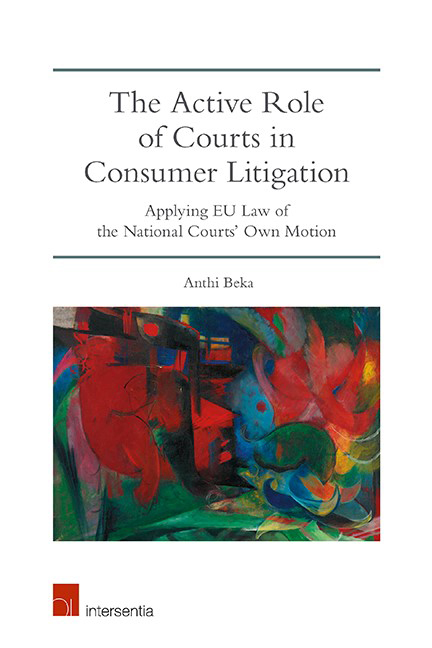Book contents
- Frontmatter
- Dedication
- Foreword by Professor Elise Poillot
- Introduction by Judge Etienne Rigal
- Acknowledgments
- Contents
- List of Cases
- List of Abbreviations
- Introduction
- PART I THE DOCTRINE OF THE ACTIVE CONSUMER COURT IN CONTEXT
- PART II THE EMERGENCE AND DISTINCTIVE FEATURES OF THE ACTIVE CONSUMER COURT DOCTRINE
- Chapter 4 The Establishment, Refinement and Consequences of Application of the Active Consumer Court Doctrine
- Chapter 5 The Impact of the Active Consumer Court Doctrine in Specific Proceedings
- Chapter 6 The Influence and Effectiveness of the Active Consumer Court Doctrine οn National Legal Systems
- Final Conclusions: Changing the Narrative and Moving Forward
- Bibliography
- Index
- About the Author
Chapter 6 - The Influence and Effectiveness of the Active Consumer Court Doctrine οn National Legal Systems
from PART II - THE EMERGENCE AND DISTINCTIVE FEATURES OF THE ACTIVE CONSUMER COURT DOCTRINE
Published online by Cambridge University Press: 31 January 2019
- Frontmatter
- Dedication
- Foreword by Professor Elise Poillot
- Introduction by Judge Etienne Rigal
- Acknowledgments
- Contents
- List of Cases
- List of Abbreviations
- Introduction
- PART I THE DOCTRINE OF THE ACTIVE CONSUMER COURT IN CONTEXT
- PART II THE EMERGENCE AND DISTINCTIVE FEATURES OF THE ACTIVE CONSUMER COURT DOCTRINE
- Chapter 4 The Establishment, Refinement and Consequences of Application of the Active Consumer Court Doctrine
- Chapter 5 The Impact of the Active Consumer Court Doctrine in Specific Proceedings
- Chapter 6 The Influence and Effectiveness of the Active Consumer Court Doctrine οn National Legal Systems
- Final Conclusions: Changing the Narrative and Moving Forward
- Bibliography
- Index
- About the Author
Summary
This chapter attempts to illustrate the influence of the active consumer court doctrine upon national legal orders, by giving examples where national legislation was modified to give effect to the doctrine. This influence is not restricted to instances where the Court has found a certain national provision incompatible with Union law. It suffices that the national legislator has taken into account the respective developments at the level of Union case law. The illustrations derive from three legal orders where a clear imprint of the case law of the Court could be identified. The first one is Spain, where certain legislative provisions had to be revamped in order to comply with the decisions of the Court. The second example is France. The case law of the Court had an“ accelerating effect” on the decision of the French legislator to enshrine the duty of courts in the French Consumer Code (Code de la Consommation). The final example is from the UK and the express provision on the duty of courts in consumer litigation involving unfair terms in the Consumer Rights Act 2015.
This chapter demonstrates the recognition by national legislators of the distinctiveness of proceedings involving consumers. It depends on the Member States to identify the appropriate way to accommodate the active consumer court doctrine in national procedural laws. In France, for instance, the legislator chose to introduce a provision on the powers of the courts in the Code de la Consommation in view of the former position to the contrary of the Cour de Cassation which has given rise to uncertainty. Such legislative intervention would not be necessary only if it is already clear to the courts that they have to discharge their positive role in consumer law proceedings. The effect of this in some jurisdictions would be to recognize that in the field of consumer protection law, the theory that a relative nullity cannot be raised by a court of its own motion does not apply.
Moreover, the body of case law of national supreme courts, in which they interpret national law in line with the case law of the Court, dispels uncertainty. Such body of case law is a valuable source of guidance for national jurisdictions.
- Type
- Chapter
- Information
- The Active Role of Courts in Consumer LitigationApplying EU Law of the National Courts’ Own Motion, pp. 313 - 352Publisher: IntersentiaPrint publication year: 2018



